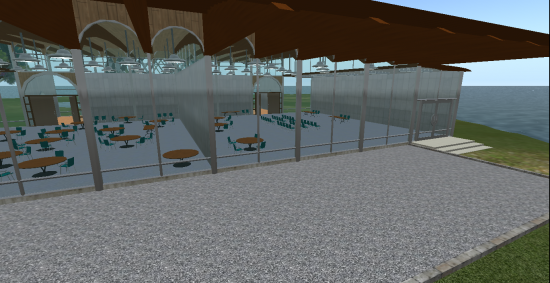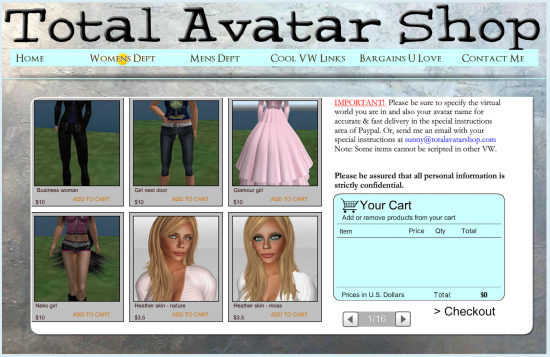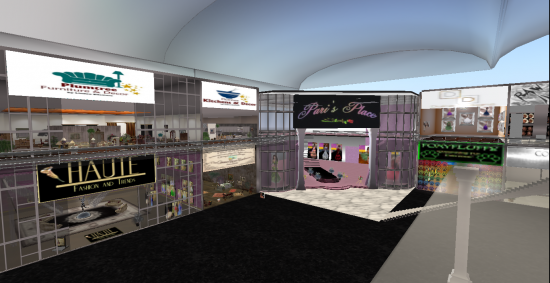Kitely users will no longer be able to copy and export content that they don’t have copy or transfer permissions for, the company announced today.
Previously, users could make full duplicates of entire regions, or save full regions as OAR files, with a simple click of a button.
Now, Kitely will check whether users have the right to copy objects before creating the duplicate region and only objects allowed to be copied will be duplicated.
For OAR exports, objects will need to have both copy and transfer permissions.

That’s because “exported worlds can be given to other people,” said Oren Hurvitz, co-founder and VP R&D of Kitely, in the announcement.
Kitely is now the first grid to do automatic permission checking before generating a region backup file. Commercial grids tend to restrict OAR exports, while other grids and hosting providers allow full OAR exports.
OAR exports allow region owners to keep personal backups of their builds, move their regions from one grid or hosting provider to another, easily share builds with others, sell entire regions to customers, or keep a library of regions that they load up when they need them. For example, a company can save a large convention build in the form of OAR files and only load it up once a year when it’s needed.

OARs are quick to save and quick to load, and include everything located on the region — objects, textures, scripts, and terrains.

When creating a copy or a backup, Kitely won’t check if an object is allowed to be modified, Kitely CEO Ilan Tochner told Hypergrid Business. But all permissions are preserved when an OAR is uploaded to a new grid, he said, so a user who couldn’t modify an object on Kitely will still not be able to modify the object when it’s uploaded to, say, OSGrid or a private standalone.
“This is something which is very easy to change,” Tochner added. “If we hear that the majority of people wish to limit exports to full perm objects only, then we can update the code.”
He added that people looking to steal content have other tools at their disposal, and those tools are available even on closed commercial grids like Second Life that don’t allow any OAR exports at all.
More like grid than hosting company
“Many people hold the  misconception that we just provide throw-away on-demand regions,” said Tochner.
However, people are starting to use their Kitely regions the same way they do regions on other grids, as persistent destinations available 24-7, with small communities of users grouping together, he said.
“But as those worlds are currently hard to find, many people think Kitely isn’t community-oriented,” he said. “We intend to fix this misconception in our next build when we roll out an automatically updated list of public Kitely worlds sorted by the number of people who are currently visiting them. This will allow people to easily visit the entire public Kitely universe and find other people who are currently inworld.”
However, the biggest problem that OpenSim users have is the lack of legally-licensed content, Tochner said.
And the biggest obstacle keeping content creators coming to OpenSim — except for a few creators like Linda Kellie, and Vanish Seraph and other creators on OpenSim Creations — is the security issue.

“After having talked to many content creators, it became clear that we needed to improve OpenSim’s content protection in order to convince prominent Second Life content creators to start providing their wares to the OpenSim community,” Tochner said. “We wanted to do so while maintaining people’s ability to export their assets from one OpenSim grid to another. We therefore decided to extend OpenSim’s existing permission system and use it for asset transfers via OAR files as well.”
Merchants will be able to set up shop inside Kitely and sell their goods via PayPal, he said, though delivery has to be manual since Kitely doesn’t yet have in-world payments implemented.
And merchants with popular stores don’t have to worry about traffic racking up high hosting costs. Kitely regions will cost 20 cents per visitor per hour once billing is implemented next month, but region owners will have the option to pass that cost to the visitors themselves, Tochner said. All users will get a certain number of free credits to start with, making it painless for new users.
“This will enable content developers to set up shops inside Kitely for very little cost,” he said.
And, by setting their items to “no transfer” merchants can ensure that their objects stay within the Kitely universe.
Will other grids follow suit?
The source code for the feature that lets OpenSim software check permissions during an OAR export will soon be available for other grids to use.
“This is an OpenSim enhancement that we intend to contribute back to the community once we get some user feedback,” said Tochner. “By contributing this code back to the OpenSim community we hope that many Second Life content developers will be willing to start selling or giving away their creations to people outside Second Life.”

Today, most commercial grids lock down OAR exports. Avination and InWorldz are two successful examples of this approach, and this has enabled their in-world merchant communities to flourish.

“Currently, we restrict OARs to backup purposes only, and have had to turn down OAR requests by region owners because of copyright concerns,” 3rd Rock Grid owner Jim St. Clair told Hypergrid Business. 3rd Rock Grid is a 193-region closed commercial grid. “I feel that this is an unfortunate situation, and would welcome a more flexible solution that maintained the rights of the creator while also respecting the needs of the [region] owner.”
St. Clair welcomed Kitely’s innovation.
“I think it would be a useful tool, and we would at least test and consider it,” he said, but added that he would like to see some more fine-grained controls, as well. “A switch to specify whether or not to restrict the export based on creator would be a helpful addition, I think.”
That would require changes to permissions system, however, both on the server and on the viewer ends. Kitely’s code works with the permissions as they now exist in Second Life and OpenSim.
“I think it’s great that Kitely is donating this code back to OpenSim, as all the OpenSim pure-based grids can definitely make use of this,” InWorldz co-founder Beth Reischl told Hypergrid Business. InWorldz is a 834-region closed commercial grid. “It will also help bolster the OpenSim reputation that’s been knocked hard over content creator protection. Does it fully stop intellectual property theft? No, but this is a great step in that direction, and we’re very happy to hear it’s being donated.”
One commercial grid, the German-language, 127-region Virtyou grid, won’t need the Kitely code because it already has similar functionality, though its approach is a step more restrictive.
“We are filtering OARs when exporting backups for our users,” Virtyou CTO Michael Steinmetz told Hypergrid Business.
The OAR exports will have objects created by the region owner, as well as objects that have full permissions — copy, transfer, and modify. That includes all the textures on the full-perm objects, he added. “So no textured objects are broken.”
Virtyou will make accommodations for region owners who have contractors working for them, however.
“If you give us a listed of builders that have a working contract… with you, we can product a backup that holds all their stuff, too,” Steinmetz  said. “But this is theoretical — it hasn’t happened on our grid yet. And if we ever have the case of sim owners that want to move onto another grid, I would probably talk to them and try to arrange with the new grid to give them a full copy of the OAR, but this hasn’t happened yet either.”
Another possible trouble area is if region owners rent out part of their land to shops — they would not be able to export the content of those shops just because they’re located on their land. In that case, Steinmetz said, he would either exclude those particular objects from the OAR export, or talk to both parties involved.
Virtyou itself, like all grids, makes full backups of all regions, in case anything happens, or region owners need to revert to a previous version of the build.
- Analysts predict drop in headset sales this year - March 25, 2025
- OSgrid enters immediate long-term maintenance - March 5, 2025
- OSgrid wiping its database on March 21: You have five weeks to save your stuff - February 15, 2025
